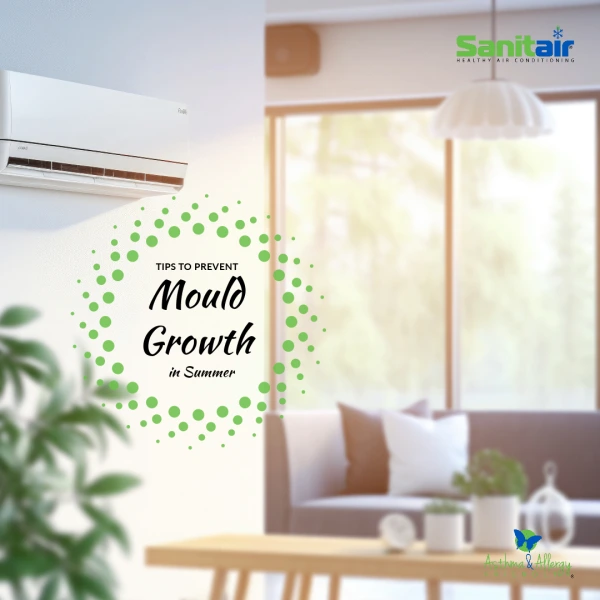
Increased Mould Growth in Air Conditioners During Summer: Tips to Prevent Mould Growth
Mould growth in air conditioning systems is influenced by a combination of factors, including temperature, humidity, and the presence of organic material. While mould can develop in air conditioners throughout the year, it does tend to grow faster in summer for several reasons
- Higher humidity: Summer is generally associated with higher humidity levels, especially in regions with hot and muggy climates. Mould thrives in humid environments, as moisture is a key factor for growth.
- Condensation: Air conditioners operate by cooling warm air and removing moisture from it. During the summer, when hot outdoor air meets the cold coils inside the unit, condensation occurs. This condensation forms on the coils and draining system, creating a damp environment that promotes mould growth. In particularly humid climates, this moisture build-up can be even more pronounced.
- Organic material: Mould requires organic material to grow. Air conditioners can provide an ideal environment for mould growth because they often contain dust, dirt and organic debris, such as pet dander, which can accumulate in the ducts and on the cooling coils.
- Poor Ventilation: In an effort to keep indoor spaces cool, people often keep windows and doors closed and rely on air conditioning. This lack of ventilation can trap moisture indoors, leading to mould growth.
- High Temperatures: While mould prefers moisture, it can still grow in warm temperatures. High temperatures can cause condensation to form on cooler surfaces, and this moisture can support mould growth.
- Darkness: Air conditioning systems are typically in dark and in enclosed spaces, making them favourable for mould. Mould prefers dark environments, which are often cooler like the interior of air conditioning units
- Infrequent use: Some people may use their air conditioners less frequently during cooler months, allowing dust and debris to accumulate within the system. When the air conditioner is then switched on during the summer, these contaminants can become airborne and provide additional organic material for mould to feed on.
- Lack of maintenance: Many homeowners may neglect regular air conditioner maintains. This can lead to dirty filters, clogged drainage systems, bacterial contamination build up on the coils and other issues that creates a more conductive environment for mould growth. Neglecting maintenance during the summer months can exacerbate the problem.
To prevent mould growth in the summer, consider the following tips:
Control Humidity: Use dehumidifiers or air conditioners to maintain indoor humidity levels below 50%. Properly sized air conditioning systems can help reduce indoor humidity.
Ventilate: When outdoor conditions permit, open windows and doors to improve ventilation and reduce indoor humidity.
Check for Leaks: Regularly inspect your air conditioner and your home for any leaks or water intrusion, and repair them promptly.
Maintain Your Air Conditioner: Make sure your air conditioning system is in good working condition, and clean or replace air filters as needed. If the coils have contamination get a professional air con clean and sanitise.
Use Exhaust Fans: Use exhaust fans in kitchens and bathrooms to remove excess moisture from these areas.
Use Indoor Fans: Use your indoor room fans or pedestal fans to keep the air circulating. Ensure the blades are clean so it doesn't add to the problem by flicking around more contaminants.
Keep Indoor Surfaces Dry: Wipe down surfaces that become moist, such as bathroom tiles or windows, to prevent mould growth.
Monitor and Control Temperature: Maintain a comfortable indoor temperature to reduce condensation on cool surfaces.
If you suspect mould growth in your Air Conditioner, it's important to address it promptly. Mould can be a health hazard and can damage your property. You may need to consult with a professional HVAC Hygienist – Sanitair have over 65 locations around the country – Free Call 1800 130 168.
We have professional Sanitair® HVAC Hygienists specialising in air conditioning cleaning in Darwin, Cairns, Townsville, Mackay, Rockhampton, Sunshine Coast, Hervey Bay, Brisbane, Logan, Redlands, Toowoomba, Ipswich, Gold Coast, Tweed Coast, Northern Rivers, Coffs Harbour, Port Macquarie, Port Stephens, Newcastle, Hunter Valley, Lake Macquarie, Central Coast, Northern Beaches, Upper North Shore, Sydney, Parramatta, Sutherland, Wollongong, Dubbo, Wagga Wagga, Albury, Orange, Canberra, Nowra, Batemans Bay, Adelaide, Melbourne, Mornington Peninsula, Tasmania, Albany, Mandurah, Goldfields, Bunbury, Perth South, Perth, Midwest, Gascoyne, Pilbara and everywhere our technicians can travel. If you are not listed above it is more than likely that one of our technicians will travel to you, to find out call us 1800 130 168.

